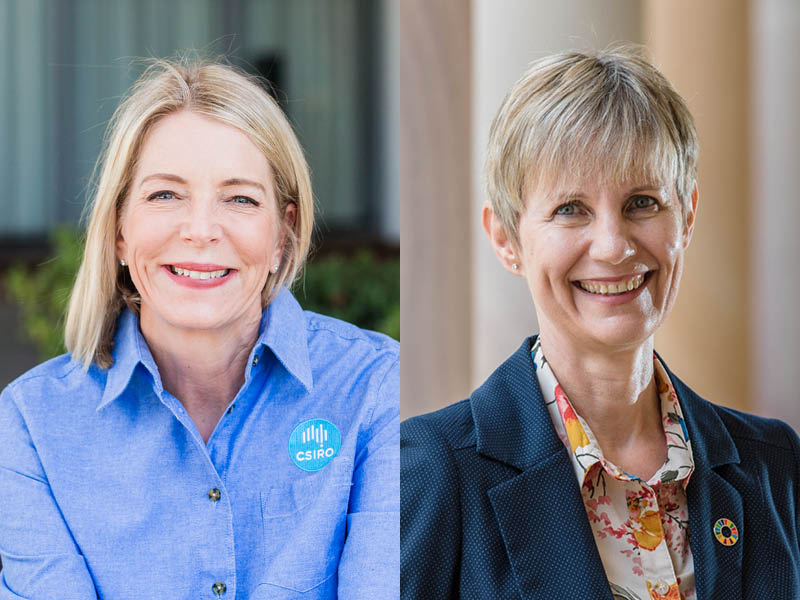Connecting small and medium enterprises (SMEs) with Australia’s brightest minds is a delicate process involving research partnerships, facilitation, funding and collaborative guidance.
This is where Australia’s national science agency and innovation catalyst, CSIRO, comes in.
“We bring people together in the innovation ecosystem, connect them with the right expertise, facilities, or funding, and support them to grow and flourish,” CSIRO’s executive director of Future Industries Kirsten Rose said.
“Research is a critical first step, and from there SMEs need to be able to use the outcomes of that research into their businesses in a meaningful way.
“That may mean improved processes, products and services. Many small businesses simply don’t have the capacity, or capability, to do research like that. This is where CSIRO can help.”

A recent example is Australian cleaning product company, Wash Wild, which found success by filling a market void for environmentally conscious ingredients. CSIRO worked with the company through its Kick-Start program (which recently expanded its eligibility criteria), to develop a unique formula, W4C®, using native oils.
Launched in Woolworths in early 2022, the product has since attracted seed funding from prominent Australian and international investors.
“Bondi Wash CEO and founder, Belinda Everingham, said it was CSIRO’s affordability, research expertise and accessibility that were the key business drivers behind their decision to collaborate on the project,” Ms Rose said.
Wholesale energy powerhouse Amber Electric, protein powder producer Australian Plant Proteins’ optimised faba-bean protein extraction and the Indigenous-owned, native-plant extracts business Secret Harvest are just a few of the many Kick-Start success stories.
Through Kick-Start and other programs, CSIRO’s SME Connect team facilitated nearly 350 research projects nationally for over 290 companies, which injected more than $33 million into research and development in Australia last financial year.
“These types of support programs play a critical role in helping SMEs engage with R&D, and even though the programs take time and money, SMEs find they get to the market faster by engaging in collaboration,” according to Martie-Louise Verreynne, Professor in Innovation and Associate Dean (Research) in the Business, Economics and Law faculty at the University of Queensland.
Professor Verreynne’s research in open innovation (which looks at how innovation is co-created), focuses on how small firms leverage capabilities and networks, such as through universities and research institutes, to gain a competitive edge.
“Improving their innovative capability and capacity is a key benefit,” she said.
“Actual outcomes, such as creating new products and putting new processes in place; improving their reputation in the market (market credibility is a big outcome); getting access to a wider range of stakeholders and audience, in general, also have a broad impact on the innovation ecosystem in which SMEs work.”
Professor Verreynne and her team collaborated with CSIRO on the Enablers and Barriers to Industry-research Collaboration report, which interviewed 800 small business leaders to understand why some SMEs collaborate on R&D with universities and research institutes, such as CSIRO, and others do not.
Not surprisingly, the businesses surveyed highlighted the important role of facilitators with relevant expertise and experience to supporting good outcomes for SMEs.
“The role of facilitators was probably the most important things to make collaborations between universities and SMEs work,” Professor Verreynne said.
“This finding was reiterated in other research projects that we’ve undertaken, and while existing programs like Kick-Start work to help engage small businesses with specific research institutes, the need is much broader, and more work can still be done.”
Professor Verreynne also highlighted the market gap for medium-sized businesses looking to innovate and collaborate, where no programs currently exist that offer matched funding and the guidance of an experienced facilitator.
Other common barriers to initiating collaboration between SMEs and URIs include: a lack of information and contacts (a so-called ‘front-door’); financial investment; a ‘champion’ within the business; and differences in goals, cultures, and ways of operation.
“Without these pieces of the puzzle, funding alone will not enable collaborations” says Professor Verreynne.
SMEs also consider how eventual business outcomes of increased innovation and market opportunities are offset by the two key boundary conditions of time and money to participate in grant programs, so SMEs consistently trade-off short-term investments with medium-to-long term returns.
Professor Verreynne and her team also worked with CSIRO to launch the Collaboration Readiness Levels Tool in November last year, as a vehicle for businesses to gauge their readiness to collaborate with the R&D sector.
Marking its one-year anniversary with participation from more than 400 Australian businesses, the online tool continues to promote engagement with this invaluable mechanism for SMEs.
“The tool shows there’s a real need to understand what the pain points are for SMEs in terms of collaboration, and for these to be addressed by the SMEs themselves or through support programs or strategic collaborations” Professor Verreynne said.
The message, however, is simple: Australian SMEs must invest in research and development for their future livelihood, sustainability and prosperity.
Professor Verreynne is working with CSIRO once more to understand, value and quantify the commercial outcomes for SMEs that have and do engage with universities and research institutes through a brief 10-minute survey.
If this applies to your business, please click here to take the survey.
This article was produced by InnovationAus.com in partnership with CSIRO.
Do you know more? Contact James Riley via Email.
